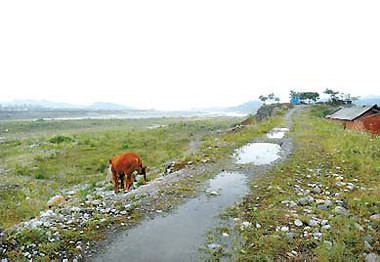With her tent near three aging temples and hundreds of meters away from the next household in Bandengqiao, Wu lives on selling rape seed from which she makes an average monthly income of 400 to 500 yuan.
"I don't necessarily want to live in the new (Beichuan)," she said. "I still want to work on my own land multi-storey buildings are (okay, but) beyond me. They're too expensive."
Meanwhile, as reconstruction day draws near, citizens of Beichuan are still reluctant to leave their town.
Xu Bin, 42, is one of them. A former factory worker in Wenchuan used to live in Beichuan.
"Wenchuan suffered much less than Beichuan, where the population is a lot more dispersed," Xu said. He is staying in a tent and hopes to soon shift to a mobile home in a resettlement region in Yong'an.
"For safety's sake, I am willing to move (to the new site of Beichuan). Otherwise, I would still prefer to live in my home, where I have spent my whole life," he said.
Xu's wife and two daughters all survived the quake. He said it was the children's education that was worrying him most.
"I'll still likely go elsewhere to work (as a migrant worker), but I don't know where yet. And with nothing left, how can my kids continue to go to school?"
Xu's elder daughter, Xu Juan, will be sitting for the national college entrance exam next year. She was rescued from the debris of her Beichuan Middle School.
Xu's another daughter Xu Yanling, is a fifth-grader in Renjiaping Primary School, where all, except for one student, escaped the quake.
Yanling's principal Shen Jibin wants her students to go to a school in Qingdao, Shandong province.
"We are willing to send Yanling to Qingdao for her studies. With my daughters' education issue settled, I'll be able to put all my efforts into reconstructing my homeland," Xu said.

A view of Bandengqiao, a possible sit for the new Beichuan.
(China Daily June 12, 2008)